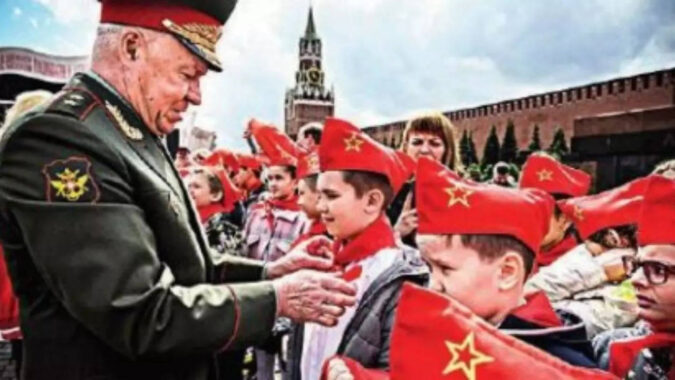A new version of the ABC’s in Russia’s Far East starts with “A is for Army, Bis for Brotherhood” — and injects a snappy phrase with every letter, like, “Love your Army”. A swim meet in the southern city of Magnitogorsk featured adolescents diving into the pool wearing camouflage uniforms, while other competitors slung model Kalashnikov rifles across their backs. “Snipers” was the theme adopted for math classes at an elementary school in central Russia, with paper stars enumerating would-be bullet holes on a target drawn on the chalkboard.
As the war in Ukraine rolls into its 16th month, educational programmes across Russia are awash in lessons and extracurricular activities built around military themes and patriotism. These efforts are part of an expansive Kremlin campaign to militarize Russian society, to train future generations to revere the army and to further entrench President Vladimir Putin’s narrative that “a real war has once again been unleashed on our motherland,” as he declared in a sober address at a ceremony last month.
The drumbeat of indoctrination essentially started withRussia’s 2014 annexation of Crimea, but the full-scale invasion of Ukraine has accelerated it. The ministry of education releases a constant stream of material, including step-by-step lesson plans and real-life examples —like a video of a student concert that used poetry, dance and theater to explain the history of Russian foreign intelligence.
“It includes all levels, from kindergarten to university,” said Daniil Ken, the head of the Alliance of Teachers, an independent Russian union. “They are trying to involve all these children, all students, directly in supporting the war. ” For years, Russia’s leaders sought to condition its citizens to accept Moscow’s leadership, partly by banning politics from schools. Now the Kremlin hopes to persuade the public to activelyback the war effort, and when it comes to younger males, to fight. Interviews with sociologists, educators, parents and students, and a review of extensive material online posted by the schools themselves and by local news outlets, show a comprehensive government effort to bolster military-patriotic content through all 40,000 public schools in Russia. “The single best possible way for them to get this society mobilized is to brainwash the young,” Greg Yudin, a Russian sociologist, said. The minister of education, Sergei Kravtsov, did not respond to written queries.
As the war in Ukraine rolls into its 16th month, educational programmes across Russia are awash in lessons and extracurricular activities built around military themes and patriotism. These efforts are part of an expansive Kremlin campaign to militarize Russian society, to train future generations to revere the army and to further entrench President Vladimir Putin’s narrative that “a real war has once again been unleashed on our motherland,” as he declared in a sober address at a ceremony last month.
The drumbeat of indoctrination essentially started withRussia’s 2014 annexation of Crimea, but the full-scale invasion of Ukraine has accelerated it. The ministry of education releases a constant stream of material, including step-by-step lesson plans and real-life examples —like a video of a student concert that used poetry, dance and theater to explain the history of Russian foreign intelligence.
“It includes all levels, from kindergarten to university,” said Daniil Ken, the head of the Alliance of Teachers, an independent Russian union. “They are trying to involve all these children, all students, directly in supporting the war. ” For years, Russia’s leaders sought to condition its citizens to accept Moscow’s leadership, partly by banning politics from schools. Now the Kremlin hopes to persuade the public to activelyback the war effort, and when it comes to younger males, to fight. Interviews with sociologists, educators, parents and students, and a review of extensive material online posted by the schools themselves and by local news outlets, show a comprehensive government effort to bolster military-patriotic content through all 40,000 public schools in Russia. “The single best possible way for them to get this society mobilized is to brainwash the young,” Greg Yudin, a Russian sociologist, said. The minister of education, Sergei Kravtsov, did not respond to written queries.
